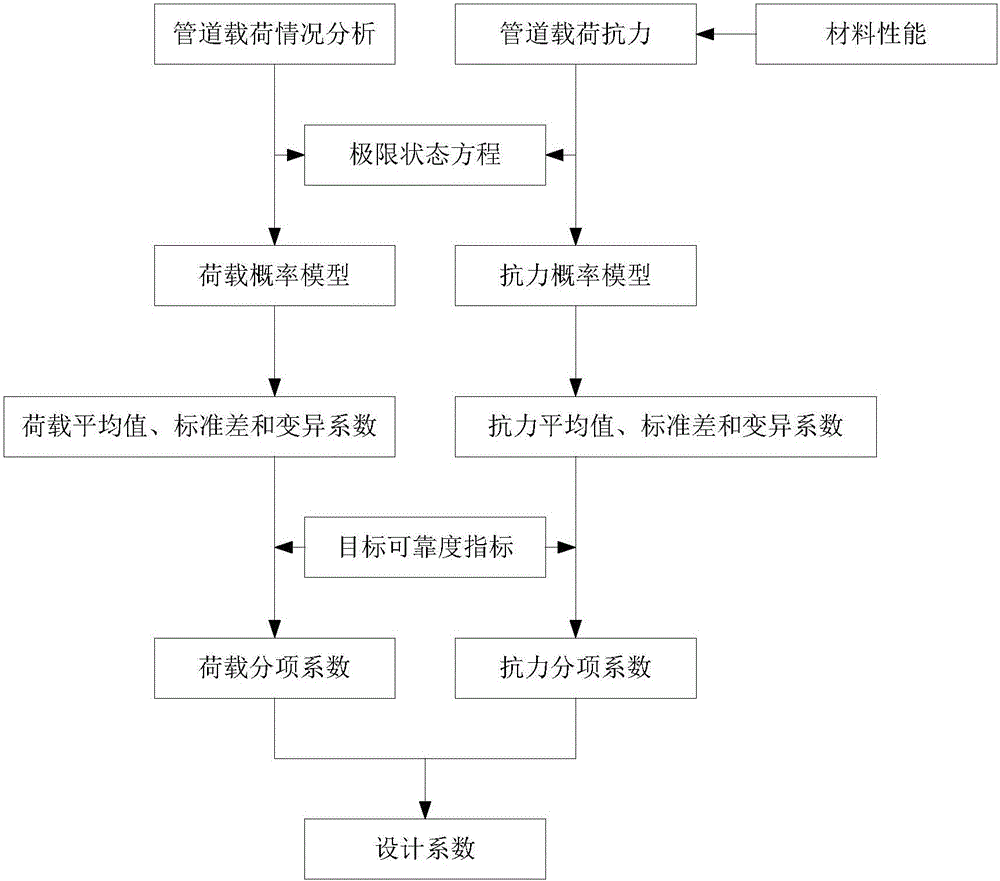Method for determining design coefficient of reinforced thermoplastic pipe (RTP)
A technology that enhances compounding and determines methods, and is applied in computer-aided design, calculation, electrical digital data processing, etc., and can solve problems such as limiting the scope of application, RTP pipes cannot be used, and the strength of RTP pipes cannot be fully utilized.
- Summary
- Abstract
- Description
- Claims
- Application Information
AI Technical Summary
Problems solved by technology
Method used
Image
Examples
Embodiment 1
[0149] Example 1, such as figure 1 As shown, a method for determining the design coefficient of a thermoplastic reinforced composite pipeline described in the embodiment of the present invention, the method includes:
[0150] Step 1, analyze the load l of the thermoplastic reinforced composite pipe, including internal pressure load, bending load, external pressure load, axial tensile load, temperature difference load and combined load, and obtain the distribution state and eigenvalue of each load design variable. At the same time, Analyze the load resistance r of the pipeline according to the material properties of the pipeline, and obtain the distribution state and eigenvalue of each design variable of the load resistance;
[0151] Step 2, establishing the limit state function g, load probability model and resistance probability model under different load conditions, including internal pressure load, bending load, external pressure load, axial tensile load, temperature differ...
Embodiment 2
[0168] Example 2, oil and gas long-distance pipelines can be divided into buried pipelines and open-pit pipelines according to different laying methods. The main load types are divided into five types of loads: internal pressure load, bending load, external pressure load, axial tensile load and temperature difference load; the statistical principle of the probability model of each load is based on the concept of design reference period and extreme load .
[0169] Under the internal pressure load, the resistance r is the burst pressure, and the load l is the internal pressure of the pipeline.
[0170] The resistance probability model satisfies the normal distribution, and the resistance design variables include d, r i 、r o , α, σ bg , σ bp , a, N, combined with the material properties of the pipeline, the geometric parameters of the components and the calculation mode of the resistance, determine the probability distribution of each design variable of the resistance. The p...
Embodiment 3
[0179] Example 3, under bending load, the resistance r is the critical strain ε relative to the local longitudinal bending of the pipeline crit , the load l is the strain ε caused by the bending load th ;
[0180] The limit state function for local buckling due to restricted thermal expansion becomes:
[0181] g=ε crit -ε th (9)
[0182] ϵ c r i t = 0.28 × ( t D m ) / μ z r ; - - - ( 10 )
[0183] ε th = R 0 / R b (11)
[0184] In the formula,
[0185] t is the wall thickness of the pipe; D m is the average diameter of the pipe; μ zr is the Poisson’s ratio in the p...
PUM
 Login to View More
Login to View More Abstract
Description
Claims
Application Information
 Login to View More
Login to View More - R&D
- Intellectual Property
- Life Sciences
- Materials
- Tech Scout
- Unparalleled Data Quality
- Higher Quality Content
- 60% Fewer Hallucinations
Browse by: Latest US Patents, China's latest patents, Technical Efficacy Thesaurus, Application Domain, Technology Topic, Popular Technical Reports.
© 2025 PatSnap. All rights reserved.Legal|Privacy policy|Modern Slavery Act Transparency Statement|Sitemap|About US| Contact US: help@patsnap.com



